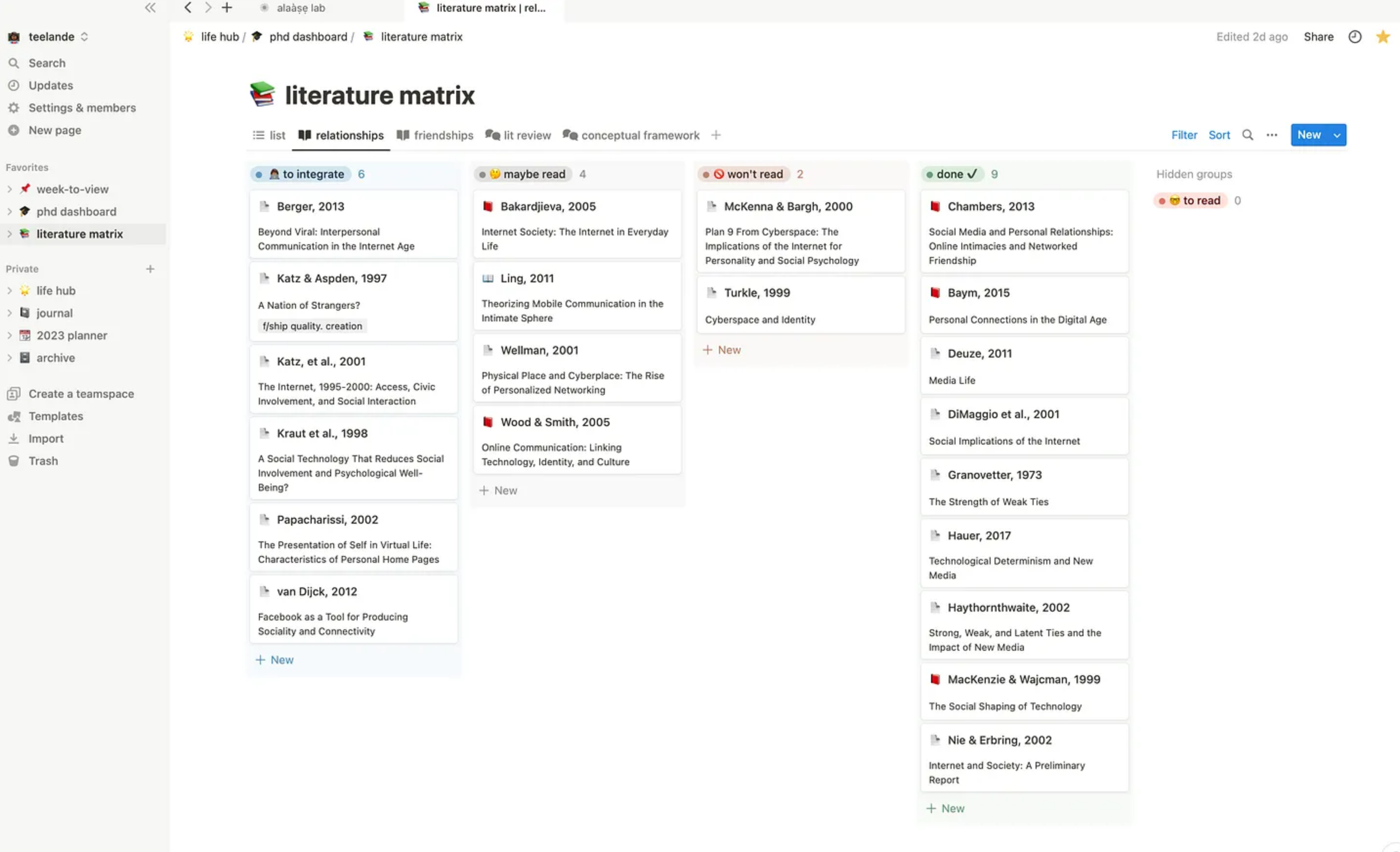research notes: #1
I would argue that the literature review is the thing most associated with the doing of a PhD. Before I started my PhD, I often imagined myself sitting with books, highlighter out, scribbling away summaries and my thoughts on whatever I was reading. I was mostly correct —except most of what I read are academic journal articles (80%) rather than book chapters/books (20%).
The literature review is at once systematic outlining of relevant research to your field and research questions, critical analysis, and storytelling. It’s storytelling, because writing the/a literature review is a craft: if done well, it deftly shapes the background context the thesis is situated in while building a narrative of why this particular thesis is needed. If done poorly, it’s a long, dreary read of various studies that don’t coherently tell the reader (examiner) why you chose these research questions, or anything at all, except: people did some research.
My Notion literature review page — how I organise literature
But what do I know? I don’t have my PhD yet and I haven’t submitted my literature review chapter yet, either 🙃. But I have read a lot of literature reviews: in article form, in book chapters, and in other theses. I like to think I can identify what separates the good from the bad.
One of the most brilliant theoretical articles I have read is by Sarah Elwood, titled “Digital Geographies, Feminist Relationality, Black and Queer Code Studies: Thriving Otherwise.” Elwood’s work is transdisciplinary like mine; they are a Professor and Chair in the department of Geography. Elwood’s “Current activities include research on poverty politics of creative activisms around homelessness, feminist and critical race theorizations of digital geographies, and a collaborative public scholarly project on horizons of critical poverty studies under emerging nationalist populisms”.1
In the above article, they theorise an alternate practice of life and thriving that is grounded in Black and Queer code studies and feminist relationality. To do so they contextualise the epistemological urgency of alternate theorisations with a literature review to devastating effect. I was reading and nodding and highlighting all over this article. I was moved, even when I didn’t fully understand what Elwood was saying (I think it’s quite a dense read). I could feel the urgency and the importance of their intervention. In short: it’s goodt ass writing. Take the following as an example:
Elwood 2021, p. 211
Elwood here makes a point: that there is a need to theorise technological mediation beyond formulations of dominance and extraction, while citing scholarship that supports this argument. This looks like a simple paragraph but it’s not. To write this way is to have read and thought and considered so much. Plus, when it is commonly said amongst academics that a majority of us (them?..not me chile) can’t write…it stands out when you can.
As the subtitle of this issue hints at: I am currently writing my literature review. It is hard work. The organising of knowledge, the sorting and parsing of that information, the breadth required and the depth required to illustrate the landscape your work exists in and the story you are trying to tell. I’m tired!!!!!!!!!!!!!!!!!!!
My research is about digital intimacy. It’s also about Black women’s online practices and behaviour. I connect the latter to diaspora, relationality and Black feminist praxis of belonging/care. This means I need to cover: interpersonal relationships online, racialised and gender online communicative practice, mediated friendship and digital intimacy as empirical study and concept. I also need to cover the other concepts of intimacy, diaspora, friendship and relationality. Basically: I be reading.
I was talking with other Black women PhDs and Drs and we’re unanimous: the literature review is a hoe. It is somewhat generative, but it’s also the most draining, and least ROI-giving part of the PhD. And there’s nothing you can do but go through it.
So yeah: it might kill me for real. But it’ll be worth it if the story is there.
1 https://geography.washington.edu/people/sarah-elwood


